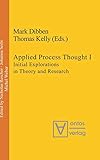Applied Process Thought : Initial Explorations in Theory and Research / ed. by Mark Dibben, Thomas Kelly.
Material type: TextSeries: Process Thought ; 16Publisher: Berlin ; Boston : De Gruyter, [2013]Copyright date: ©2008Description: 1 online resource (389 p.) : Zahlr. AbbContent type:
TextSeries: Process Thought ; 16Publisher: Berlin ; Boston : De Gruyter, [2013]Copyright date: ©2008Description: 1 online resource (389 p.) : Zahlr. AbbContent type: - 9783110328042
- 9783110328400
- 153.42 23
- B1674.W353
- online - DeGruyter
- Issued also in print.
| Item type | Current library | Call number | URL | Status | Notes | Barcode | |
|---|---|---|---|---|---|---|---|
 eBook
eBook
|
Biblioteca "Angelicum" Pont. Univ. S.Tommaso d'Aquino Nuvola online | online - DeGruyter (Browse shelf(Opens below)) | Online access | Not for loan (Accesso limitato) | Accesso per gli utenti autorizzati / Access for authorized users | (dgr)9783110328400 |
Frontmatter -- Contents -- Contributors -- Foreword -- Preface -- Acknowledgements -- Introduction: What is Applied Process Thought? -- I. Unifying Process Philosophy: Secular Metaphysics and Fragmentary Influences -- II. Unity Through Divergence -- III. Mediating the Divide: Process Philosophy between the Two Cultures -- IV. From Grown Organism to Organic Growth -- V. A Whiteheadian Critical Theory -- VI. A Whiteheadian Perspective on Nature and Freedom -- VII. A Whiteheadian Metaphysics of Light -- VIII. Water as a Metaphoric Model in Process Thought -- IX. Explaining the Processual Behaviour of a Cell -- X. Enzymes as Ecosystems: A Panexperientialist Account of Biocatalytic Chemical Transformations -- XI. The Embodied Mind and Inter-Subjectivity: Reflections on Autism -- XII. Social Science Contributions to the Love-And-Science Symbiosis -- XIII. Understanding Organizations as Whiteheadian Societies -- XIV. Facts and Events: Whiteheadian Philosophy of History -- XV. Process Philosophy and Ecological Ethics -- Table of Contents -- Process Thought
restricted access online access with authorization star
http://purl.org/coar/access_right/c_16ec
Concentrating mainly on the process philosophy developed by Alfred North Whitehead, this series of essays brings together some of the newest developments in the application of process thinking to the physical and social sciences. These essays, by established scholars in the field, demonstrate how a wider and deeper understanding of the world can be obtained using process philosophical concepts, how the distortions and blockages inevitably inherent in substantivist talk can be set aside, and how new and fertile lines of research in the sciences can be opened as a result.
Issued also in print.
Mode of access: Internet via World Wide Web.
In English.
Description based on online resource; title from PDF title page (publisher's Web site, viewed 28. Feb 2023)


